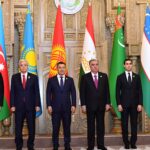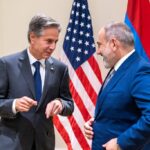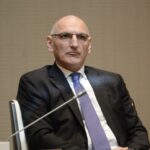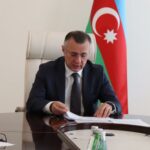In his interview with the Euronews channel during the 10th ministerial meeting within the framework of the Southern Gas Corridor Consultative Council and the 2nd ministerial meeting of the Green Energy Consultative Council, President Ilham Aliyev touched on a very important topic of rational resource use by oil and gas exporting countries and the transformation of financial resources into human capital. During his speech, the head of state noted that it is incorrect to blame countries with oil and gas reserves. Instead of criticizing them, it would be more appropriate to evaluate their activities in terms of measures taken for the “green transition” and efforts made to protect the environment. The term “blame” was used because the price policies of hydrocarbon-exporting countries impact the growth rate of the global economy and individual countries that purchase these resources.
For example, the current situation in the global oil market, where OPEC and OPEC+ countries decided to reduce oil production volumes, illustrates this. The average daily oil production by OPEC+ countries in January 2024 decreased by 340,000 barrels per day compared to December 2023, totaling 41.2 million barrels. Naturally, this led to stable or increasing market prices, which is unfavorable for oil-importing countries. This clash of interests led to a specific conflict with the USA in 2021, which advocated for higher prices. The fuel cost in the USA reached $3.7 per gallon, the highest in seven years.
On October 31, 2021, US President Joe Biden explained the market situation by stating, “Russia, Saudi Arabia, and other major producers are not willing to pump more oil to help people get to work, for example.” Other major oil consumers, including Japan and India, also hoped to persuade OPEC+ to increase production rates. This led to an active lobbying campaign against oil-exporting countries in the three largest countries of the world.
This situation is just one of many episodes of the ongoing confrontation in the energy market. President Ilham Aliyev believes that the situation should not be evaluated from the standpoint of supply and demand in this market, but rather in terms of the contribution that hydrocarbon exporters make to increasingly significant global economic issues, such as climate preservation and the transition to “green energy.” The main focus is on how the funds received by exporting countries are spent. Azerbaijan serves as an example in this regard.
For instance, Azerbaijan’s foreign currency reserves increased from $1.6 billion in 2003 to $69.5 billion today, largely due to the sale of hydrocarbon resources, ensuring the country’s economic and financial independence. Over the last decades, many projects of economic and social value have been implemented. For example, extensive construction is underway in the liberated territories, where about 5,400 former internally displaced persons have been resettled in five settlements. By the end of 2024, former displaced persons are expected to return to at least 20 settlements, with plans to resettle 20,000 people in 5 cities and 15 villages on the liberated lands by the end of the year. Moreover, master plans for more than 100 cities and villages have been prepared and approved, with construction already underway in many of them. The first phase of the “Great Return” program is expected to be completed by the end of 2026, with 140,000 former displaced persons returning to their native lands. This includes not only housing but also social infrastructure, such as hospitals, schools, sports facilities, and infrastructure projects, including roads, over 130 tunnels, and 90 bridges. Looking at the issue comprehensively, the focus is on creating an acceptable standard of living for people, which represents an investment in human capital.
From the perspective of an ordinary citizen, human capital comprises the knowledge, skills, and health that individuals invest in and accumulate throughout their lives, enabling them to realize their potential as productive members of society. However, from a state’s perspective, human capital is not just about the number of people living within its borders but creating conditions for them to live comfortably and fully utilize their knowledge and capabilities for both personal development and the development of the state as a whole. This is why even purely economic achievements recorded in recent years in our country should be seen as investments in human capital. That’s why, looking forward, the country sets goals to prepare professionals who could elevate Azerbaijan to the ranks of technologically advanced nations.
To this end, in recent years, several thousand young citizens of the country have undergone training and special programs in technology development, digitalization, cybersecurity, and the application of artificial intelligence. However, this is still clearly insufficient, highlighting the need to improve the level of training in these fields.
President’s thoughts on transforming the revenues of energy resource-exporting countries into green energy are also quite interesting. This transition is a priority for the state’s development in the coming decades. According to plans, by the end of 2030, Azerbaijan aims to generate about 5,000 megawatts of renewable energy, primarily from solar, wind, and hydroelectric power plants. To achieve this goal, corresponding contracts are being signed with foreign partners. A significant portion of electricity will be produced from renewable sources – wind turbines, solar panels, etc. The International Finance Corporation, a division of the World Bank, has identified Azerbaijan’s wind potential at 157,000 megawatts. As a result, by integrating 2 gigawatts of green energy production capacities into the energy system by 2027, the share of renewable energy sources in the total production will reach 33 percent by 2027.
Just as in the oil and gas sector, where Azerbaijan already acts as a supplier of traditional energy, projects aimed at developing green energy corridors “Caspian Sea-Black Sea-Europe” and “Central Asia-Azerbaijan-Europe” will give an impulse to the country’s development and position Azerbaijan in the world as an exporter of “green” energy.
For the implementation of the green energy corridor through Azerbaijan and Turkey, as a major strategic project, the construction of a 330-kilovolt substation and power lines in Jabrayil and Nakhchivan, the integration of these energy systems, and the construction of a converter substation on the border with Turkey are necessary. Additionally, the Azerbaijan-Turkey-Europe energy corridor could become another potential direction for exporting electricity from Central Asia through Azerbaijan.
Currently, tripartite cooperation for transporting “green” energy from Kazakhstan and Uzbekistan to Europe through the Caspian Sea-Black Sea-Europe energy corridor is being carried out via Azerbaijani territory. The implementation of the Azerbaijan-Turkey-Europe energy corridor will diversify the export capabilities of Central Asian countries and promote “green” energy cooperation among Turkic states. Notably, Azerbaijan recently held talks with the European Union to expedite the granting of the PMI (Project Mutual Interest) status to the “Caspian – EU Green Energy Corridor” project. All this is a consequence of why Azerbaijan joined a series of global initiatives at the COP28 event and took responsibility to support the global “green growth” initiative and accelerate decarbonization at COP29, which will be held in 2024 in Baku.










